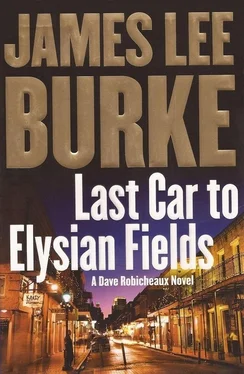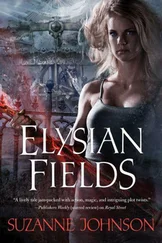Father Jimmie and I parked in the front yard of his house on the bayou and walked around to the back, where Hogman was hoeing weeds out of a garden next to his bottle tree. He stopped his work and smiled, then saw my expression.
“Why’d you jump me over the hurdles?” I said.
“You mean about Junior?” he said.
“You got it,” I replied.
“Junior punched his own ticket. You might t’ink he was a hero, but back in them days, if a nigger got mixed up wit’ a white woman, all of us had to suffer for it.”
“How about spelling that out for me?” I said.
The year was 1951. Hank Williams and Lefty Frizzell played on every jukebox in the South, and across the ocean GIs packed snow on the barrels of .30 caliber machine guns to keep them from melting while they mowed down wave after wave of Chinese troops pouring into North Korea.
But in central Louisiana, a group of black convicts who knew little or nothing of the larger world suddenly found themselves transferred from Angola Penitentiary to a work camp for nonviolent offenders deep down in bayou country. The camp had been created out of the remnants of what had been called the quarters on Fox Run Plantation. None of the convicts knew what to expect. The first morning they found out.
They were given clean denims, soap, toothpaste, good work shoes, and were told to burn their striped pants and jumpers in a trash barrel behind the camp. The beatings with the black Betty, the sweat-boxes and anthill-treatment, the fecal-smelling lockdown units, the killings by guards on the Red Hat Gang, became only a memory at Fox Run.
Sometimes a truculent inmate was forced to wear leg irons or stand all night on an upended bucket, and the food they ate the greens, fatback, beans, corn bread, and molasses was the same fare served at Angola; but the guards were not allowed to abuse them, and at night the inmates slept in cabins with mosquito screens on the windows, boiled coffee in the fireplace, played cards and listened to radios, and on holidays had preserves and cookies to eat.
The humane treatment they received was due solely to one person: Miss Andrea, as they called her, the wife of Castille LeJeune.
The other inmates had been in the camp six months when Junior transferred in from the Red Hat Gang. The first time he saw her he was in the bottom of an irrigation canal with Hogman Patin, raking mounds of yellowed weeds out of the water and flinging them up on the embankment. She was riding English saddle on a black gelding, her long hair tied behind her head, her white riding pants skintight across her rump and thighs. Her small hand was cupped around a braided quirt.
“That’s her, huh?” Junior said.
“Who?” Hogman said.
“Miz LeJeune,” Junior said.
“What you care who she is?”
“She wrote me a letter.”
“Shit.”
“That’s right. Up at the joint. Tole me how much she liked my music. She’s a fine-looking woman.”
“You get them t’oughts out of your head, nigger,” Hogman said.
“You boys eye-balling down there?” the guard said from horseback.
Among Junior’s few possessions was a guitar, a twelve-string Stella he had bought in a New Orleans pawnshop. He tuned the double-strung E, A, and D strings an octave apart so that the chords reverberating out of the sound hole gave the impression of two guitars being played simultaneously. Each evening, after supper, he played on the front steps of his cabin, his steel finger picks glinting in the setting of the sun, his voice rising into a sky filled with clouds that looked like colored smoke.
Then, one spring night, while he played on the steps, he saw her car stop on the road. It was a purple 1948 Ford convertible, with an immaculate white, buttoned-down top. She was smoking a cigarette behind the wheel, her skin softly lit by the green illumination of the dashboard. She listened to him play until she had finished her cigarette, then she dropped it outside the window, restarted her engine, and drove away.
In July, on a languid Saturday morning, a guard by the name of Jackson Posey told Junior to put on a fresh change of state blues, to brush his shoes, comb his hair, bring his guitar, and get in the guard’s pickup truck. As the two of them drove toward the big house, Junior could feel the guard’s irritation like a palpable presence inside the cab.
“What’s going on, boss?” Junior asked.
Jackson Posey did not reply. Although he was often called boss, he held the rank of captain, one he had earned by shepherding convicts under the gun for two decades, pulling almost the same kind of time as his charges. But the fact he was a captain was a matter of great pride to him, because it meant he was literate and had administrative duties within the penal system. His forearms were pocked with early indications of skin cancer, the top of his forehead half-mooned like a sliver of melon rind where he normally wore a hat. He put three fingers into a pouch of Red Man and inserted the string tobacco into his jaw, then drove around to the back of the big house and parked under a mulberry tree.
Junior could see Andrea Castille seated on the patio, a pitcher of lemonade on a glass table beside her. A recording machine, the kind that made use of wire spools, rested on the brickwork by her foot, an extension cord running back through the French doors into the house.
Inside the living room a little girl, a miniature of her mother, played on the rug with wood blocks.
“I always treated you fair, ain’t I?” the guard said.
“Yes, suh,” Junior said.
“Then it don’t hurt to tell Miss Andrea that, does it?”
“No, suh.”
“You stay where I can see you,” he said.
“Wouldn’t have it no other way, boss.”
Jackson Posey narrowed one watery blue eye, as though squinting down a rifle barrel. “You sassing me?” he said.
Junior shut the truck door behind him and approached Andrea Castille with his guitar cradled under his right arm. She wore a pink sundress and dark glasses and a gold cross on a chain around her throat. “Can you play “Goodnight Irene’?” she said.
“Yes, ma’am, I learned it from the man who wrote it,” he replied.
“I’d like to record you while you do it. That is, if you don’t mind.”
“No, ma’am, I’m glad to.”
“Would you like to sit down?”
“Standing is just fine, ma’am.”
He slipped the cloth strap of the guitar around his neck and sang for her, feeling foolish at the contrived nature of the situation, wondering if the guard’s eyes were burrowing into his back or if Andrea Castille’s husband was watching him from an upstairs window.
“You have a wonderful voice,” she said. “Sit down. Please, it’s all right.”
“Ma’am, I’m a convict.” Involuntarily his eyes swept across the back windows of the house.
She seemed to resign herself to his recalcitrance. “Would you sing another song?” she said.
He sang one of his own compositions. The breeze had dropped and his shirt was damp against his skin. He could not see her eyes behind her dark glasses, but he believed they were invading his person. His fingers were moist and clumsy on the frets, his voice uncertain. A muscle spasm sliced across his back from the odd angle in which he was holding the Stella.
He stopped and blotted his face on his sleeve, his heart beating. Why was he behaving like this?
But he already knew the answer. He wanted her approval just like an organ grinder’s monkey.
“I hurt my back in the field yesterday. Just ain’t myself,” he said.
“Maybe you can come another time, when you’re feeling better,” she said.
He shook his head negatively, his eyes lowered, his frustration and anger at himself rising. But she didn’t give him time to speak. “I have something for you. I’ll be just a minute,” she said.
Читать дальше












